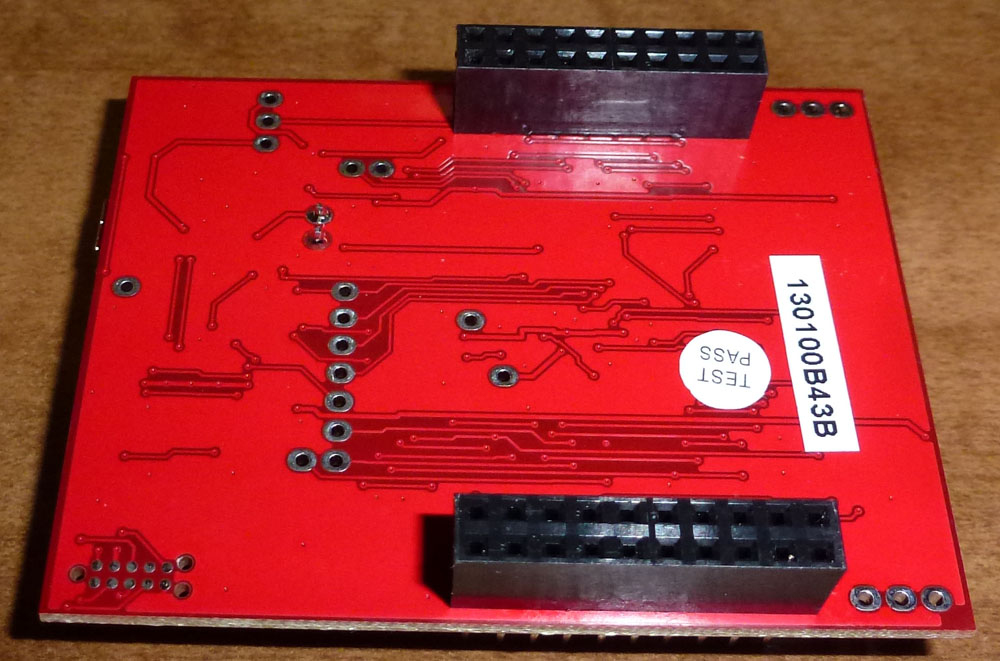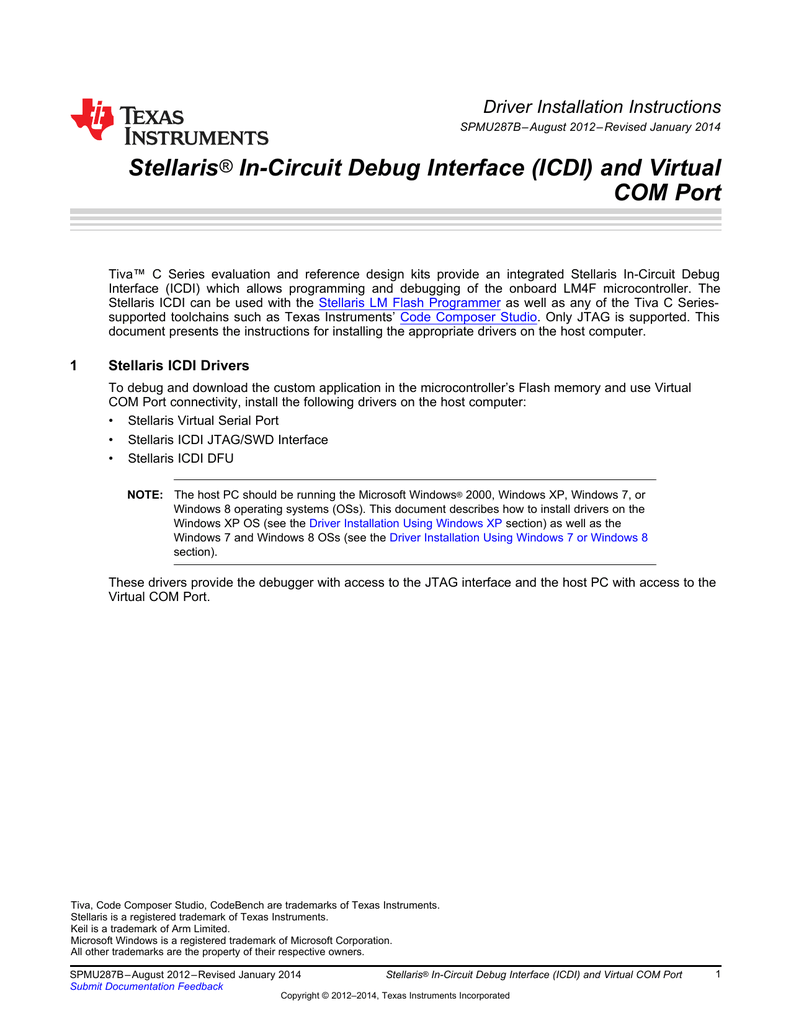Please note as of Wednesday, August 15th, 2018 this wiki has been set to read only. If you are a TI Employee and require Edit ability please contact x0211426 from the company directory.
- Stellaris Lm4f120 Launchpad Evaluation Board User Manual Online
- Stellaris Lm4f120 Launchpad Evaluation Board User Manual Instructions
- Stellaris Lm4f120 Launchpad Evaluation Board User Manual 2016
- Stellaris Lm4f120 Launchpad Evaluation Board User Manual Free
- Stellaris Lm4f120 Launchpad Evaluation Board User Manual Software
Board Overview The Stellaris® LM4F120 LaunchPad Evaluation Board (EK-LM4F120XL) is a low-cost evaluation platform for ARM® Cortex™-M4F-based microcontrollers. The Stellaris® LaunchPad’s design highlights the LM4F120H5QR microcontroller's USB 2.0 Device interface and Hibernation module. Jan 05, 2014 Learn to use the buttons in your stellaris launchpad microcontroller to read digital inputs. Link to code: http://allaboutee.com/2014/01/06/stellaris-launchp. By comparing the Stellaris® LM4F120 LaunchPad Evaluation Board User Manual SPMU289A and Tiva™ C Series TM4C123G LaunchPad Evaluation Board User's Guide SPMU296 I found the following differences: 1) The EK-TM4C123GXL doesn't populate the U4 (TLV803MDBZR Voltage Supervisor with Active-Low, Open Drain Reset), R17 and D2 components, Comment on.
- 2Introduction

PLEASE NOTE:
This workshop has been upgraded to the new Tiva TM4C123G LaunchPad Workshop located here. No further changes will be made to this page as of 14May2013.

Version 1.10 March 2013 Labs are based on CCS 5.3
Introduction
The Getting Started with the Stellaris EK-LM4F120XL LaunchPad Workshop is a free, in-depth, hands-on introduction into Stellaris LM4F basics including:
- Introduction to the ARM® Cortex™-M4F and Peripherals
- Introduction to Code Composer Studio
- StellarisWare, Initialization and GPIO
- Interrupts and the Timers
- ADC12
- The Hibernation Module
- USB
- Memory
- The Floating-Point Unit
- BoosterPacks and the Graphics Library
- Synchronous Serial Interface (no video)
- UART (no video)
- uDMA (no video)
Each of these sections includes an in-depth lab that will step you through the usage, programming and testing of the peripheral(s) or tool(s) covered.
The workshop is based on the low cost, expandable Stellaris LaunchPad Evaluation Kit[1]. The LaunchPad board features an 80MHz LM4F120H5QR microcontroller, on-board emulation and BoosterPack XL format expansion pins. The LM4F120H5QR microcontroller has 256KB of flash memory, 32KB of RAM, 2KB of EEPROM, two 12-bit analog to digital converters, a USB 2.0 device port, a hibernation module, other serial connectivity and flexible GPIO.
Stellaris devices[2] are supported by several Integrated Development Environments: Mentor Graphics® Mentor Embedded IDE[3], IAR Systems Embedded Workbench[4], ARM®’s Keil™ microVision IDE[5] and Texas Instrument®’s Eclipse-based Code Composer Studio™[6]. The workshop labs are based on Code Composer Studio, which is free and fully functional when connected to the LaunchPad board.
The workshop labs are constructed using StellarisWare™[7]. StellarisWare is an extensive suite of license and royalty-free software designed to simplify and speed development of Stellaris-based microcontroller applications. StellarisWare includes the Peripheral Driver Library and the Graphics Library. The Peripheral Driver library is a set of functions for controlling the peripherals found on the Stellaris family of ARM Cortex-M microcontrollers. All LM4F devices provide this code in on-board ROM. The Stellaris Graphics Library is a set of graphics primitives and widgets for creating graphical user interfaces on Stellaris microcontroller-based boards that have a graphical display.
Expandability of the LaunchPad board is accomplished through its BoosterPack XL connectors. These connectors are backwards compatible with the original BoosterPack connectors. There are many BoosterPacks available through TI and third parties. In order to highlight the expansion capabilities of the Stellaris LaunchPad board and the use of the graphics library, the workshop includes the Kentec Display 3.5” LCD TouchScreen BoosterPack (8bit) [8]. You can purchase the BoosterPack directly from the manufacturer or through Newark Electronics.
Alternatively, you can buy SSD1289 3,2' LCD 16 bit color + Touch Boosterpack danirebollo version: (kentec:8bit, danirebollo:16bit. both works with TI Graphics library).
Newly added to the workshop is Chapter 11: Synchronous Serial Interface. In order to run the lab you will need to purchase and modify an Olimex 8x8 LED BoosterPack . These boards are available through Mouser Electronics . Complete instructions on the needed modifications are in the chapter 11 lab.
3,2' Touch LCD boosterpack SSD1289 (danirebollo)
Here is the Touch LCD Boosterpack for Tiva, Stellaris and Hercules Launchpad. It works with Texas Instruments Graphics Library and uses SSD1289 LCD Driver for 3,2' 320x240 Screen and analog signals for Touch (TI Graphics Library uses analog signals). The interface are hi speed 16bit color parallel Also, you can use EHA protocol to control it only through 4 wire bus.
You can found example codes and buy it on danirebollo.es website
Info:Texas Instruments Graphics Library: http://www.ti.com/tool/sw-tm4c-grl?sectionId=625&tabId=2495&familyId=1755SSD1289 LCD Driver: https://docs.google.com/file/d/0BzJpWEe1yMQvMVpEZm1DNVpLR2s/edit?usp=sharingand https://docs.google.com/file/d/0BzJpWEe1yMQvR2c5ZEJlU1NhX1E/edit

Attend a Live Workshop
You can attend a live version of this workshop taught by an experienced Texas Instruments instructor. Sign up here.
Hardware Requirements
To run the labs, you will need the following:
- A 32 or 64-bit Windows XP, Windows 7 or Windows 8 laptop with 2G or more of free hard drive space. 1G of RAM should be considered a minimum … more is better.
- A laptop with Wi-Fi is highly desirable
- If you are working the labs from home, a second monitor will make the process much easier. If you are attending a live workshop, you are welcome to bring one.
- If you are attending a live workshop, please bring a set of earphones or ear-buds.
- If you are attending a live workshop, you will receive an evaluation board; otherwise you need to purchase one.[9]
- If you are attending a live workshop, a digital multi-meter will be provided; otherwise you need to purchase one like the inexpensive version here [10]
- If you are attending a live workshop, you will receive a second A-male to micro-B-male USB cable. Otherwise, you will need to provide your own to complete Lab 7.
- If you are attending a live workshop, you will receive a Kentec 3.5” TFT LCD Touch Screen BoosterPack (Part# EB-LM4F120-L35). Otherwise, you will need to provide your own to complete Lab 10. You can purchase the BoosterPack directly from the manufacturer or through Newark Electronics.
- If you are attending a live workshop, Olimex 8x8 LED BoosterPacks will be available with both modifications. If you want to run this lab from home you will need to obtain and modify the board as detailed in the chapter 11 lab.
Software Requirements
To run the labs, you will need the following:
- Code Composer Studio 5.3 or later[11]
- StellarisWare[12]
- The LM Flash Programmer[13]
- The latest ICDI drivers[14]
- The lab installation file[15]
- The workshop workbook[16]
- A terminal program like HyperTerminal (WinXP) or PuTTY[17]
- The Windows side USB examples[18]
- GIMP image manipulation tool[19]
Complete instructions for downloading and installing this software is in Chapter 1 of the workbook or in the installation guide.
Workshop Material
- The workbook pdf file
- The labs installation file
- The zipped PowerPoint presentation
- The Word doc files used to create the workbook
- The installation guide for workshop attendees
Workshop Videos
Additional Videos
Stellaris Lm4f120 Launchpad Evaluation Board User Manual Online
Stellaris Lm4f120 Launchpad Evaluation Board User Manual Instructions
Project Zero Wiki
Other Resources (SEO)
Stellaris Lm4f120 Launchpad Evaluation Board User Manual 2016
Stellaris Lm4f120 Launchpad Evaluation Board User Manual Free
| For technical support please post your questions at http://e2e.ti.com. Please post only comments about the article Getting Started with the Stellaris EK-LM4F120XL LaunchPad Workshop here. |
| Links | |||
|